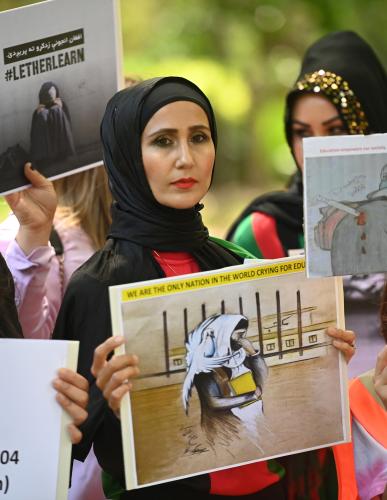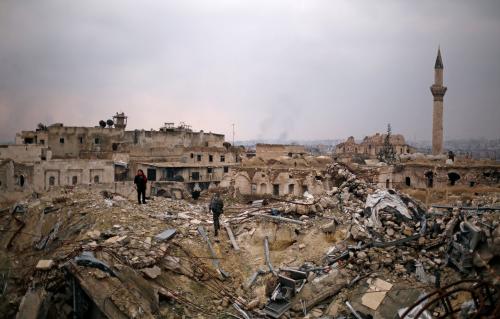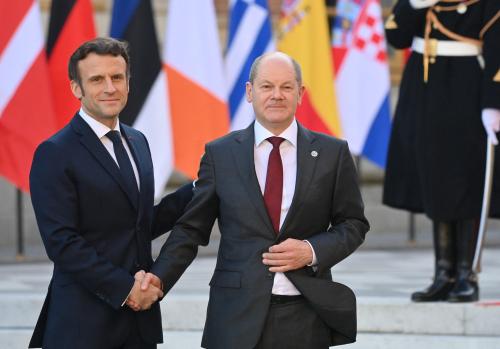SCOTT SIMON: We’re turning now to Susan Rice, former assistant secretary of State for African Affairs during the Clinton administration. Ms. Rice is now a senior fellow at The Brookings Institution. Thanks very much for being back with us in the studio.
SIMON: And you were recently in the councils of power at the White House and the security establishment in the State Department, but could you just tell us what your reaction is to the confusion we’ve been talking about between what seemed to be the position of the CIA and the White House?
RICE: Yes, indeed. Scott, I spent four and a half years as a member of the National Security Council’s staff, and I find it quite extraordinary as well as dishonorable and disingenuous for the national security adviser to blame the CIA director for this foul-up. This text—the language we’re talking about—these 16 words obviously originated in the White House. The national security adviser is the senior official ultimately responsible for what goes into the State of the Union address with respect to foreign policy and national security. I think the White House needs to take responsibility and not put all the blame on other agencies, who get the draft at the last minute and have a short period of time in which to comment and concur. I think George Tenet did the honorable thing by taking responsibility, but there are many others who haven’t taken responsibility and it seems to me they ought to.
SIMON: Well, would his or any CIA director’s responsibility be to read a draft like that, call up and say, ‘You must not put this in the speech’?
RICE: You know, the State of the Union address goes out to the agencies at the very last minute. This is something that’s crafted very carefully in the White House. It gets to the agency, and they have to farm it out to the relevant officials and there’s a very short fuse in which to respond. So it’s quite possible that the CIA director himself never had an opportunity personally to look at it, and he may well be taking a bullet here for people in his agency; again, an honorable thing to do.
But nevertheless, yes, they should have looked at it more carefully. They might have raised a red flag to the White House, but the real question is: Why did the White House have that in there in the first place? They knew that the text was suspicious, and now why are they blaming the CIA exclusively and not taking any responsibility themselves?
SIMON: Let’s turn back to the president’s trip to Africa because US military experts, Marines I believe, principally, have been on the ground over the past week. A decision is expected soon on a commitment of US troops. Do you have any feeling or even some information as to which way the administration might be leaning?
RICE: Well, I think the administration has signaled during the course of the week they’re going to do something in Liberia. What that something is remains to be determined. And I think there seems to be still a tug-of-war between the Defense Department and the State Department over how robust that commitment ought to be. I think they’re looking now towards a rather minimalist approach. That may involve logistic support, flying in the West African forces, but they’re also going to have to provide some…
SIMON: These would be from Nigeria and Ghana?
RICE: Nigeria, Ghana, perhaps Senegal, but they’re also going to have some significant American presence on the ground if this is to be credible, if it’s going to answer the call from the states in the region, from the British, the French and the United Nations. Whether those are combat troops or perhaps troops in a headquarter-support capacity I think remains to be seen, but simply to fly them in and say, ‘Sayonara and have a few dollars,’ I don’t think that will fly and I don’t think that’s consistent with the level of commitment the president has articulated to Africa during this week.
SIMON: You are familiar with the fact that sometimes politicians pay attention to opinion polls.
RICE: Indeed.
SIMON: A ABC-Washington Post poll this week shows that 51 percent of Americans oppose sending troops to Liberia as quote, “part of an international force to enforce a cease-fire,” but more support if Americans are sent as peacekeepers. Now what does this tell us about the apprehension we the American public have for this kind of mission?
RICE: Well, frankly, Scott, I’m surprised that that many people are open to a peacekeeping or peace enforcement mission at this point because the administration hasn’t yet made the case for why this is in our national security and humanitarian interests. So those numbers are actually rather encouraging, but they do make a distinction between peacekeeping, which is viewed as a humanitarian sort of gesture, relatively low risk, and enforcing a cease-fire, which I think these days conjures up images of Iraq where the situation can get quite dangerous.
SIMON: Dr. Rice, once again, I’ve left a corker of a question for the last, so forgive me. What’s your estimate of the president’s trip? Did it increase his knowledge of Africa? Did it increase the knowledge of Africans of US policy and the appreciation of Americans for Africa?
RICE: Well, I think certainly it was five days of focus on Africa which certainly was a benefit to the American people. I hope President Bush had an opportunity to get a better feel for Africa even though the time he had on the ground was very, very limited. But I’m a little bit disappointed. When you look at the possibilities that this trip had, that it wasn’t an opportunity that was entirely seized, there were no new initiatives. There was nothing new on trade, on agricultural subsidies, not even an announcement on Liberia. And so I think Africans will be looking to see in follow-up whether or not, in fact, the president’s commitment is sustained and the money he promised is pledged and made available.
SIMON: Well, let me follow up in the few seconds. Were we in the press sometimes responsible for that, to keep ask about, ‘What about this CIA report?’ Did we help to distract?
RICE: Well, I think to a certain extent, but I think frankly it’s the administration’s responsibility to set the tone. They left open questions on Liberia and this CIA issue, and that’s their responsibility.
SIMON: Dr. Susan Rice, always good to have you with us. Thank you very much.
RICE: Thank you, Scott.
SIMON: Dr. Susan Rice of The Brookings Institution, who joined us in our studios.



Commentary
Analysis of Bush’s Trip to Africa
July 12, 2003